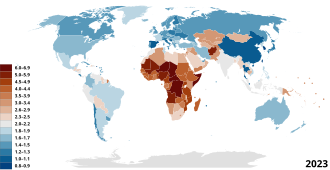Sustainable population



Sustainable population refers to a population size that can be maintained over the long term without depleting resources or harming the environment. It is a concept that intersects with sustainability, ecology, economics, and sociology. The goal of achieving a sustainable population is to ensure that human activities do not exceed the carrying capacity of the Earth, thereby preserving the planet for future generations.
Key Concepts[edit]
Carrying Capacity[edit]
Carrying capacity is the maximum number of individuals of a species that an environment can support indefinitely without degrading the environment. For humans, this includes considerations of food, water, shelter, and other resources.
Ecological Footprint[edit]
The ecological footprint measures the demand placed on the Earth's ecosystems by individuals or populations. It is a way to gauge how much land and water area a human population requires to produce the resources it consumes and to absorb its wastes, given prevailing technology.
Population Growth[edit]
Population growth refers to the increase in the number of individuals in a population. It is influenced by factors such as birth rates, death rates, immigration, and emigration. Rapid population growth can strain resources and lead to environmental degradation.
Sustainable Development[edit]
Sustainable development is development that meets the needs of the present without compromising the ability of future generations to meet their own needs. It encompasses economic growth, social inclusion, and environmental protection.
Strategies for Achieving a Sustainable Population[edit]
Family Planning[edit]
Family planning involves providing information and means for individuals to control the number and timing of their children. This can help reduce birth rates and manage population growth.
Education[edit]
Education, particularly for women and girls, is a critical factor in achieving a sustainable population. Educated individuals are more likely to make informed decisions about family size and resource use.
Economic Incentives[edit]
Economic incentives can be used to encourage smaller family sizes and sustainable resource use. These can include tax benefits, subsidies, and other financial mechanisms.
Environmental Policies[edit]
Environmental policies aimed at conserving resources and protecting ecosystems are essential for maintaining a sustainable population. These policies can include regulations on pollution, resource extraction, and land use.
Challenges[edit]
Resource Depletion[edit]
Resource depletion occurs when natural resources are consumed faster than they can be replenished. This can lead to shortages and environmental degradation.
Climate Change[edit]
Climate change poses a significant threat to achieving a sustainable population. Changes in climate can affect food and water supplies, health, and living conditions.
Social Inequality[edit]
Social inequality can exacerbate the challenges of achieving a sustainable population. Inequitable access to resources and opportunities can lead to overpopulation in some areas and underpopulation in others.
Related Pages[edit]
- Sustainability
- Ecology
- Economics
- Sociology
- Carrying capacity
- Ecological footprint
- Population growth
- Sustainable development
- Family planning
- Education
- Economic incentives
- Environmental policies
- Resource depletion
- Climate change
- Social inequality
Ad. Transform your life with W8MD's Budget GLP-1 injections from $75


W8MD offers a medical weight loss program to lose weight in Philadelphia. Our physician-supervised medical weight loss provides:
- Weight loss injections in NYC (generic and brand names):
- Zepbound / Mounjaro, Wegovy / Ozempic, Saxenda
- Most insurances accepted or discounted self-pay rates. We will obtain insurance prior authorizations if needed.
- Generic GLP1 weight loss injections from $75 for the starting dose.
- Also offer prescription weight loss medications including Phentermine, Qsymia, Diethylpropion, Contrave etc.
NYC weight loss doctor appointmentsNYC weight loss doctor appointments
Start your NYC weight loss journey today at our NYC medical weight loss and Philadelphia medical weight loss clinics.
- Call 718-946-5500 to lose weight in NYC or for medical weight loss in Philadelphia 215-676-2334.
- Tags:NYC medical weight loss, Philadelphia lose weight Zepbound NYC, Budget GLP1 weight loss injections, Wegovy Philadelphia, Wegovy NYC, Philadelphia medical weight loss, Brookly weight loss and Wegovy NYC
|
WikiMD's Wellness Encyclopedia |
| Let Food Be Thy Medicine Medicine Thy Food - Hippocrates |
Medical Disclaimer: WikiMD is not a substitute for professional medical advice. The information on WikiMD is provided as an information resource only, may be incorrect, outdated or misleading, and is not to be used or relied on for any diagnostic or treatment purposes. Please consult your health care provider before making any healthcare decisions or for guidance about a specific medical condition. WikiMD expressly disclaims responsibility, and shall have no liability, for any damages, loss, injury, or liability whatsoever suffered as a result of your reliance on the information contained in this site. By visiting this site you agree to the foregoing terms and conditions, which may from time to time be changed or supplemented by WikiMD. If you do not agree to the foregoing terms and conditions, you should not enter or use this site. See full disclaimer.
Credits:Most images are courtesy of Wikimedia commons, and templates, categories Wikipedia, licensed under CC BY SA or similar.
Translate this page: - East Asian
中文,
日本,
한국어,
South Asian
हिन्दी,
தமிழ்,
తెలుగు,
Urdu,
ಕನ್ನಡ,
Southeast Asian
Indonesian,
Vietnamese,
Thai,
မြန်မာဘာသာ,
বাংলা
European
español,
Deutsch,
français,
Greek,
português do Brasil,
polski,
română,
русский,
Nederlands,
norsk,
svenska,
suomi,
Italian
Middle Eastern & African
عربى,
Turkish,
Persian,
Hebrew,
Afrikaans,
isiZulu,
Kiswahili,
Other
Bulgarian,
Hungarian,
Czech,
Swedish,
മലയാളം,
मराठी,
ਪੰਜਾਬੀ,
ગુજરાતી,
Portuguese,
Ukrainian
